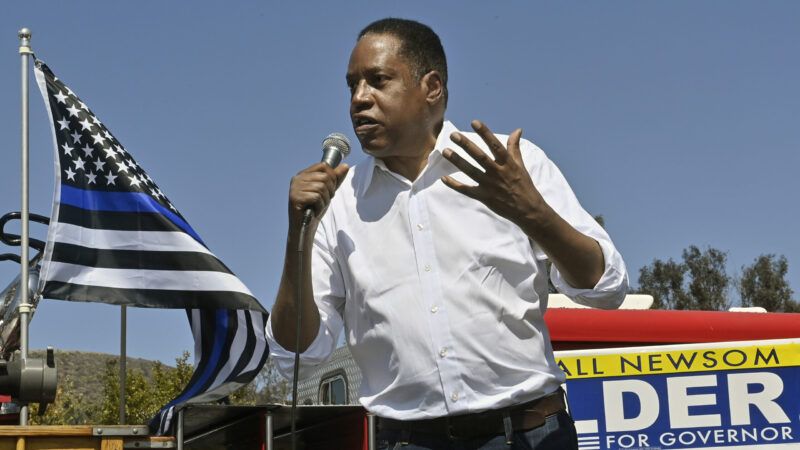Republicans Got What They Deserved in California Recall
Doubling down on stridently conservative messaging in a state where conservatives are a dwindling and fleeing minority doesn't seem like a winning strategy.

On the eve of California's second-ever gubernatorial recall election, polls showed dire news for those hoping to bounce Gavin Newsom from office and replace him with someone with a more conservative mindset. Despite my issues with the governor, I was far more disappointed with the statements from recall supporters than from the polling data.
Before voting was even finished, Republican "leaders promoted unsubstantiated claims that the race was rigged or compromised by misconduct," AP reported. It noted that leading replacement candidate, Larry Elder, said, "there might very well be shenanigans." And Donald Trump asked, "Does anybody really believe the California Recall Election isn't rigged?"
Apparently, Republicans only trust election results when they emerge as winners. That poses a long-term problem for the health of our democratic system, but—in California, in particular—it poses an existential problem for the GOP. When a party refuses to live in the real world, it's not going to make sensible decisions that help it get back in the political game.
I talked to some conservative activists in the weeks before the vote, and many of them were living in a fantasy world. Some were sure that the polls weren't accurate because of liberal polling bias and the recall really was on track, while others believed the nonsense about fraud. After Newsom scored an impressive 64 percent to 36 percent victory, recall supporters were looking for everyone but themselves to blame.
Let's see, a Democratic governor was victorious in a strongly Democratic state by margins that approximate the usual Democrat v. Republican breakdown, and the best people can do is claim voting irregularities. Sorry, but recall advocates ran one of the worst campaigns in memory. They failed to make a compelling case to non-Republicans.
I covered the 2003 recall of Gov. Gray Davis, whose incompetence in the face of rolling electricity blackouts and budget deficits led to widespread voter frustration. The electorate was more Republican 18 years ago than it is today but still was heavily Democratic. I'd argue that the list of Festivus-like grievances against Davis pales in comparison to the ones against Newsom.
The current governor has restricted charter schools, which are an educational bright spot. Violent crime is rising, homelessness is spreading civic disorder, and wildlands are on fire. There's the Employment Development Department scandal and much to critique in Newsom's handling of COVID-19. The budget is in great shape (if we ignore the state's unfunded liabilities), but there are myriad reasons for disgruntlement.
Yet in 2003, recall supporters built a broad-based coalition that focused on the key issues that upset Californians of all political persuasions. They recruited a candidate, Arnold Schwarzenegger, who not only was a popular celebrity—but who carefully pitched a moderate, bipartisan, and generally optimistic governmental reform message.
This time around, recall advocates made it perilously easy for Democrats to turn this into a partisan "Republican recall" race. I like Larry Elder and have admired his past years of libertarian-oriented punditry, but he and other GOP replacement candidates campaigned as if they were appealing to a mostly conservative electorate.
In my rural area, pro-Trump signs and those obnoxious blue-stripe flag desecrations accompanied virtually every recall-signature table. Doubling down on stridently conservative messaging in a state where conservatives are a dwindling and fleeing minority (and having insufficient resources to run compelling ads), doesn't seem like a winning strategy. Maybe that's just me.
The "yes" vote on the recall question received roughly the same percentage as Republicans routinely receive in statewide races. How surprising. Conservatives have long advocated for a take-no-prisoners campaign, but they couldn't even reach John Cox's dismal numbers. He lost to Newsom in 2018 by 24 percentage points, which is a nail-biter compared to Tuesday's showing.
I've often criticized the largely unprincipled state GOP, but at least the establishment makes an attempt to woo unaffiliated and Democratic voters. The problem started with the recall petition. Instead of focusing on broad concerns, it chided Newsom for favoring "foreign nationals, in our country illegally," as if immigrants rather than homegrown politicians are the problem.
Recallers should have recruited the right candidate before they started collecting signatures. The campaign initially put pressure on Newsom to moderate some of his coronavirus restrictions, but as the race heated up and the GOP ran right, it pushed Newsom further to the left to shore up his base. The downside always was obvious. If the recall didn't succeed, it would leave Newsom and the supermajority Democrats stronger than ever.
"Democrats have been sharpening their attacks on Republicans over the pandemic, former president Donald Trump and other polarizing topics, and now, emboldened by victory in California's recall election, party leaders are seeking to further escalate hostilities ahead of the midterm elections," The Washington Post concluded. It's hard to disagree.
Go ahead and blame voting issues. As the midterms approach, I'm sure that will be a winner.
This column was first published in The Orange County Register.


Show Comments (212)